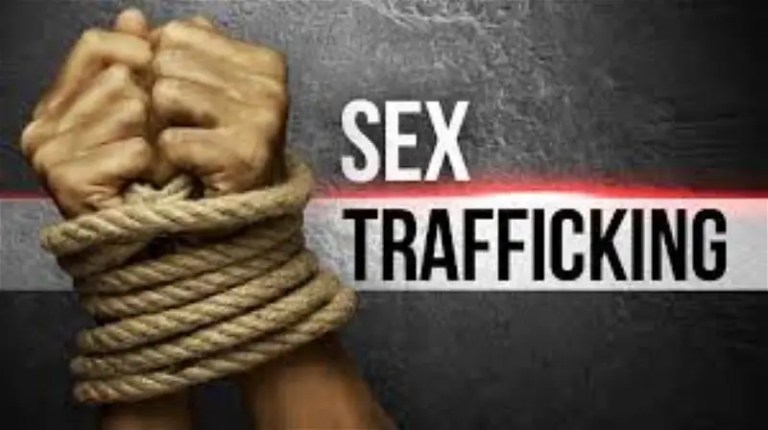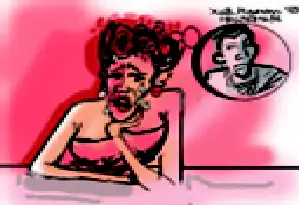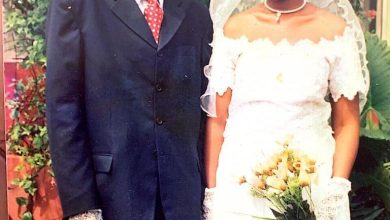I Was Lured To Libya, Sexually Molested, Jailed – Trafficking Survivor’s Heartbreaking Story

It is no longer news that many vulnerable people in Nigeria get trafficked by well organised syndicates.
These vulnerable but desperate young people get easily carried away by these friendly enemies who use empty promises and assurances to sway them into thinking they can earn a better living outside Nigeria, but ultimately become victims of sexual exploitation, forced begging and organ harvesting among others.
According to Innovations for Poverty Action, IPA, Nigeria remains a major human trafficking source, transit and destination country as estimated 750,000 to 1 million Nigerians are trafficked every year.
Speaking with a survivor who was trafficked in 2015 from Nigeria to Libya, as she shared anonymously her harrowing experience and how she was able to survive.
Crossing Sahara Desert
She said: “I left Nigeria for Libya in March 2015. I was actually seeking for greener pastures. I used to work in a pharmacy, and I kept complaining to my friend that the job wasn’t really what I wanted and I needed a better offer. She linked me to her sister in Libya, who told me her sister could help get me a better offer.
I contacted the sister, we spoke on Facebook. When I went through her page, it looked good, so I decided to join her in Libya. I told her I did not have documents to travel, but I knew I needed some documents to travel with, especially passport.
She told me that was not an issue as I could easily get a passport and come by road. The journey started from Akwa-Ibom. I met other people in Lagos, so we journeyed to Kano together. From Kano, we had people waiting for us at the park; we kept moving until we crossed the border, we passed through Sahara Desert to Libya. We spent one month 14 days on the journey.
How exploitation started
“My friend’s sister sponsored my transportation but didn’t tell me I will pay back with a huge interest. She only said I was going to refund the money she had spent on me. The total money she spent on me was N250, 000. She said I will have to work for about one year to fully pay back.
I earned about 600 Dinars a month which is 7, 200 Dinars a year. I argued that I never agreed to the decision. After going back and forth, she finally agreed that I should pay for eight months. I had no option because I was without a legal document, so I had to agree to her terms.
The first family I worked for as a maid had a very big house. I remember waking up as early as 6am and slept as late as 1am the following day because they loved thorough cleaning when working.
I complained severally, but whenever I did they would threaten to sell me off to prostitution. I worked to the extent that my hands got damaged due to the excess chemicals they gave me to work with.
Eventually, she (friend’s sister) changed my work, took me to another family, which had a smaller house compared to the previous one, and my burden reduced but the challenge I had was sexual harassment by my master. Whenever I cleaned, he would make advances at me. When I complained, they made me understand that I could not just leave like that. I kept screaming that I wanted to leave, I was very angry because of the way I was being treated.
They decided to set me up. I noticed that because whenever I came back to my room after cleaning, my belongings would not be where I placed them, sometimes I would see jewelries and money that were not mine in the bag but I would return them to my master and his family. At the end of the month, they would pay me my salary, which was 600 Dinars and tell me I will go home for my off because we were entitled to break after one month.
False allegation of stealing
But one day when I was to observe my break, as we drove, rather than taking me home, they took me to the police station and they told the police I stole from them. I was surprised. When my bag was searched, the only money seen was my salary and I explained that it was the payment I received after working but the police did not listen to me. They asked for my document, I presented my passport but they wanted other legal documents which I did not have, so they held me and took me straight to prison.
Detention, torture and release
I had rosary and chaplet tattoos on my neck which was not funny because it is an Islamic country. The tattoos made them angry, they beat and kicked me. I experienced that for three months before I was released.
No one came to bail me, it was the commandant that released me and asked me to work for him and his family because of his fondness of me. I had background knowledge in nursing; I catered for people in the prison. That is why they felt I was a bit valuable to them. I had to work with the commandant’s wife who was a medical practitioner for a while before I was totally free to leave.
NAPTIP needs support
I believe about 84 persons leave for Libya to become modern day slaves every month.
I have referred about 1,700 persons to the National Agency for the Prohibition of Trafficking in Persons, NAPTIP, since I started creating awareness against trafficking in persons. NAPTIP should be a first choice. To create more awareness, government should try and alleviate the factors putting people out there into trafficking. We need to sensitize people, let them know human trafficking is real and it is happening.
Stigmatization and healing process
We cannot deny that those who don’t know your story are quick to judge because they feel they know what you have been through, they have an opinion about everything. We need to encourage each other, ourselves first, this is the reason most people don’t come out to say they survive, because they will face stigmatization. But survivors must learn how to deal with it and move on.
95% of victims are lured into trafficking by people they know – NAPTIP DG
Meanwhile, the Director-General of NAPTIP, Fatima Waziri-Azi, told Sunday Vanguard that 95 per cent of people who get trafficked are lured by people they are familiar with.
Waziri-Azi said the agency was doing its best to comb every corner in Nigeria, especially the rural areas, for traffickers.
While speaking on the challenges NAPTIP faces, she pointed out that the trafficking hub in Nigeria generates $150 billion
yearly, saying officials often receive threats from trafficking lords.
She said: “NAPTIP is doing exactly what it needs to do but the fact remains that with the enormity of the different trends of human trafficking that we see across the country, the watchword is for us to scale up in terms of carrying out our work.
Strategy
“We employ a five-term approach of prevention, protection, prosecution, partnership and policy. And none of these approaches is more important than the other, so we apply them simultaneously.
“So while we are putting preventive mechanism in place, we are also protecting victims and while we are doing that, we are also prosecuting our cases and, of course, we can’t effectively fight the crimes of human trafficking in Nigeria without partnership which is very important.
“To be able to tackle trafficking with depths, we use a whole of society and government approach to carry everybody along, working with CSOs, NGOs, media and other stakeholders.
“Also to be able to devolve our mandate to the subnational level, we have been establishing what we call state task forces, and as of today we have established task forces in 23 states.
“The last was in Yobe that was inaugurated three weeks ago.
“We also partner traditional institutions to sensitize the rural areas, we partner with traditional rulers to sensitize and dialogue with these people. We also collaborate with community based organizations and faith based organization.
Justice
“NAPTIP is a one-stop anti-human trafficking law enforcement agency, we provide legal support, we provide rehabilitation support, we provide vocational and elementary education and reunite victims with their families.
Funds
“Due to the enormity of the problem, the emerging and evolving trend, we need more funds to do everything we are doing. “We know that, over the years, so-called orphanages and shelter homes have involved into exploiting vulnerable persons, it was because of this trend that Regulation 2019 was created.”
New trends
“There is a minimum-standard-requirement for all shelter homes which, if met, will be issued license. These are some of the checks and balances that have been put in the system to checkmate issues concerning trafficking or re-trafficking in shelter homes. “And one new trend we have also noticed is what we call orphanage trafficking whereby people go to vulnerable areas or homes, take their children and keep them in orphanages. We are clamping down on them.”
Our biggest challenge
“The biggest challenge we face as an agency is the risk that comes with the job. “We are fighting people that are involved in a trade to be known to generate $150 billion every year. We are not dealing with normal people. I have gotten threats through text messages, some might want to intimidate you not to do your job, we have had cases where people send threat messages.
“We are also faced with lack of cooperation from victims. We know that despite the myth and misconception of people thinking human traffickers are strangers, from our data, 95 per cent of people that get trafficked, are lured by people they know, it is called familiar trafficking.
“So, people find it difficult to testify against their loved ones who got them trafficked; we have a lot of cases like that where people are trafficked by family members. “But their families and communities put a lot of pressure on them not to cooperate with NAPTIP.
“Another challenge we face is when the community protects the traffickers, thinking they are trying to do something good for them, they don’t understand that they are being exploited but human trafficking can never be a family matter.
Partnerships
“For individuals and organizations, there are steps people can take to contribute to the fight against human trafficking: Support NAPTIP, advocate for change, report cases and volunteer your time and expertise. Educate yourself and educate others.
“We need to focus on ourselves, must stop being judgmental; the perception that human trafficking is prostitution or the only form of human trafficking is sexual exploitation must change, it is not only women that is trafficked for sexual exploitation, men are also trafficked for sexual exploitation.
“So, when we talk about stigmatization, I believe we need to put out judgment aside and be more supportive and empathetic to victims.”.
Nigerians need to lead fight against trafficking – JDPC
Programme Director of Justice Development and Peace Commission, JDPC, operating under Action Against trafficking in Persons Cluster, AATIP, Timothy Ejeh, on his part, said the fight against trafficking is necessary in order for Nigerians have a better society.
“Even Persons With Disabilities, PWDs, are preyed on and trafficked. Traffickers also prey more on those with disabilities because it is discovered that they possess some kind of ‘luck’, which makes their business thrive, which is very shocking”, Ejeh said.
“And, of course, you know that those who are physically challenged can be used to easily make money, which makes them easy prey for traffickers.
Camps for re-trafficking
“In the guise of providing shelter for vulnerable persons and PWDs, we have seen camps which traffick people.
One recent finding was a camp in Kaduna which claimed to train children and young adolescents.
“In the course of NAPTIP doing their investigation, it discovered that the camp was used for organ harvesting of children, which was an eye opener.
“There are other camps which keep women and children tied up for various uses.
“Sadly, some of these victims are pushed by their family members, even by their parents because they feel it is a place where they can be delivered from demons they are possessed by, these are issues of abuse and it has to stop.






